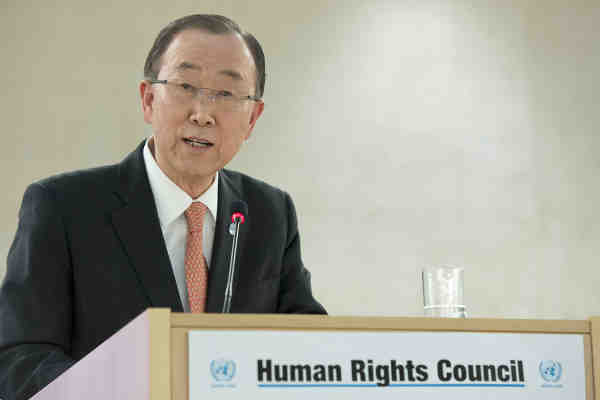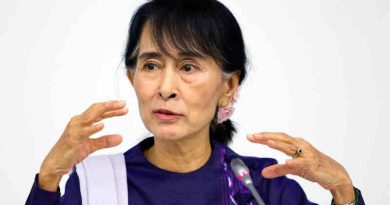Finally, the UN Offers to Resolve Kashmir Conflict

The UN Secretary-General Ban Ki-moon deplored the killings in Kashmir and offered to provide his mediation to facilitate a dialogue between India and Pakistan.
After maintaining a neutral stance for years, finally the United Nations (UN) has offered to mediate between India and Pakistan to resolved the Kashmir conflict.
In a letter written to Pakistan’s Prime Minister Nawaz Sharif, the UN Secretary-General Ban Ki-moon has appreciated the commitment of Pakistan to a peaceful resolution of Kashmir for the sake of regional peace and security.
He also deplored the killings in Kashmir and offered to provide his mediation to facilitate a dialogue between India and Pakistan if both the sides invited him to do so. This, the UN Secretary-General said, is required to “achieve a negotiated settlement.”
Ban Ki-moon’s letter was in response to Nawaz Sharif’s request to the UN to intervene and check the ongoing human rights abuses in Kashmir.
[ Kashmir Burning. Muslims Meet Indian Rulers ]
Kashmir has been facing a series of violent incidents since the killing of a 22-year-old rebel leader Burhan Wani by the Indian security forces on July 8 in an encounter which many believe was avoidable.
Nearly 80 people have died and thousands injured in the conflicts between the supporters of Burhan Wani and the Indian security forces in Kashmir, which is a disputed territory between India, Pakistan, and China.
Although Burhan Wani was branded as a terrorist by the Indian rulers, he was a freedom fighter for the tens of thousands of local Kashmiris. They rallied behind Burhan Wani to face the excesses of security forces who have been given a free hand by the Indian government to deal with all those in Kashmir who demand freedom.
[ Also Read: 15 Laws of Global Terrorism Revealed ]
Many prominent Indians have also said in the past that the people of Kashmir should be allowed to decide about their fate. A political activist Prashant Bhushan, for example, had called for a plebiscite in Kashmir and said that Kashmir should be allowed to break away from the country if Kashmiris did not want to stay as part of India.
The Guardian reported that the Booker prize-winning novelist and human rights campaigner in India Arundhati Roy was facing the threat of arrest after claiming that the disputed territory of Kashmir was not an integral part of India.
[ Sonia Gandhi: Events in Kashmir Are Tragic ]
In order to support the freedom struggle of the people of Kashmir, voices were also heard a few months ago at the Jawaharlal Nehru University (JNU) in India’s capital New Delhi. But the Indian government used its law and order machinery to successfully crush the students’ protests led by Kanhaiya Kumar, a student leader.
The students had to finally approach the government-run National Human Rights Commission (NHRC) to seek protection from the government’s security forces.
Human Rights Abuses
Kashmir has always been a conflict area between India and Pakistan since 1947 when both these countries got freedom from the British rule. In order to stake their claims over Kashmir, India and Pakistan have fought two bloody wars in 1965 and 1971, besides incessant skirmishes between the rival armies.
[ Narendra Modi Wants Peace in Troubled Kashmir ]
Repeated reports from international agencies suggest that human rights abuses in the Indian-administered Jammu and Kashmir (J&K) state are happening constantly. The abuses range from mass killings, enforced disappearances, torture, rape and sexual abuse to political repression and suppression of freedom of speech.
It is estimated that more than 50,000 people (most of them were civilians) have been killed in the Kashmir insurgency. International human rights organization Human Rights Watch has stated in its report that Indian security forces “assaulted civilians during search operations, tortured and summarily executed detainees in custody and murdered civilians in reprisal attacks.”
Another human rights organization Amnesty International said recently that the authorities in Jammu and Kashmir must stop using pellet-firing shotguns on protesters. It stated that the use of pellet-firing shotguns is not in line with international standards on the use of force.
Now, the Indian arm of Amnesty International is facing sedition charges in India for its repeated efforts to raise the issue of state atrocities in the disputed territory of Kashmir.
Amnesty India reports that a police complaint has been filed against it for an event that allowed families of the victims of human rights violations in Jammu and Kashmir to tell their stories.
The event was held on August 13 in Bengaluru (Bangalore) while the complaint, according to Amnesty, was filed two days later by a representative of Akhil Bharatiya Vidyarthi Parishad (ABVP), the student wing of the ruling Hindu group Bharatiya Janata Party (BJP).
It is alleged in the complaint that anti-India slogans were raised in the event that resulted in inciting a sentiment against the Indian state – which amounts to sedition.
The successive governments in India have tried to suppress all voices that demand even a peaceful settlement to the Kashmir conflict. They use sedition law in a freewheeling manner to intimidate the peacemakers.
Now, the UN has offered to intervene. There is a great likelihood that the UN request will go unheeded in India.
By Rakesh Raman, who is a government award-winning journalist and social scientist. You also can visit the REAL VOTER – Politics in India Information Center that he manages.




